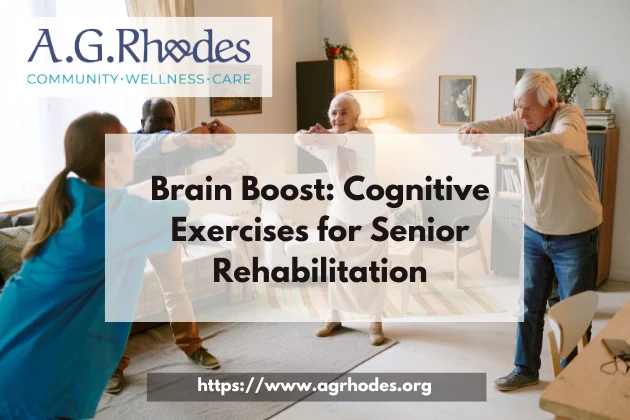
In this article, we explore the most effective cognitive rehabilitation exercises for seniors, how these activities promote healing, and how personalized therapy programs empower seniors to live more independently and confidently.
The Importance of Cognitive Health in Senior Rehabilitation
Cognitive function—encompassing memory, reasoning, attention, and language—is a cornerstone of independence and quality of life. During recovery, seniors may experience mental fatigue, confusion, or slower processing speeds, especially after a stroke, surgery, or prolonged hospitalization.
By incorporating cognitive therapy into rehabilitation, we strengthen the connection between the brain and body. Mental exercises stimulate neural pathways, encouraging neuroplasticity—the brain’s ability to reorganize and adapt. This not only helps restore lost functions but also enhances confidence and motivation, which are key drivers of successful rehabilitation.
How Cognitive Exercises Support Recovery
Integrating cognitive training into rehabilitation programs provides both neurological and emotional benefits. These exercises can help seniors:
- Improve memory recall and cognitive processing
- Enhance decision-making and attention span
- Increase independence in daily activities
- Boost emotional health and reduce depression or anxiety
- Encourage social interaction and engagement through group-based activities
Cognitive exercises can also reduce the risk of long-term decline, helping seniors sustain their mental sharpness well after therapy concludes.
Top Cognitive Exercises for Senior Rehabilitation
1. Memory Recall Activities
Memory games are an excellent way to keep the brain active. Therapists often use picture cards, sequencing tasks, or storytelling to engage short- and long-term memory. Seniors might be asked to recall names, events, or items after a few minutes or hours, gradually improving retention.
2. Problem-Solving and Logic Games
Activities like Sudoku, word puzzles, or matching games challenge analytical thinking and logic. These tasks strengthen cognitive flexibility and help seniors adapt to new situations—skills that are crucial during recovery.
3. Reading and Language Exercises
Reading aloud, completing crossword puzzles, or practicing sentence construction enhances language comprehension and verbal communication. This type of exercise is particularly beneficial for stroke patients or those experiencing mild cognitive impairment.
4. Technology-Assisted Cognitive Therapy
Many senior care facilities now incorporate computer-based cognitive training using tablets or touch-screen systems. Programs such as Lumosity, BrainHQ, and Constant Therapy provide interactive exercises that target specific brain functions, from visual processing to executive planning.
5. Physical and Cognitive Dual-Tasking
Combining light physical activity with cognitive tasks—such as counting steps while walking or answering trivia questions during movement—stimulates multiple regions of the brain simultaneously. This integrated approach improves coordination, balance, and focus.
6. Social and Emotional Interaction
Group-based activities such as music therapy, storytelling circles, or gardening sessions nurture cognitive and emotional health. These promote social connection, reduce loneliness, and keep the brain engaged through conversation and teamwork.
The Role of Speech and Occupational Therapists in Cognitive Rehabilitation
Certified speech-language pathologists (SLPs) and occupational therapists play a crucial role in cognitive recovery. They assess each senior’s cognitive strengths and challenges, designing personalized programs that target memory, comprehension, attention, and executive functioning.
For example:
- Speech therapists may help seniors rebuild language and communication skills through repetition and interactive tasks.
- Occupational therapists focus on cognitive retraining related to daily living activities—such as managing finances, organizing schedules, or remembering medication routines.
This personalized and holistic approach ensures that seniors not only regain function but also confidence in their daily lives.
Incorporating Everyday Cognitive Stimulation
Cognitive rehabilitation doesn’t stop at therapy sessions—it continues through daily life. Family members and caregivers can encourage mental stimulation through simple, enjoyable activities such as:
- Playing board games or trivia together
- Cooking using multi-step recipes
- Discussing current events or reading news articles
- Teaching seniors how to use technology (e.g., video calls or photo sharing)
- Encouraging journaling or creative writing
These activities reinforce therapy gains while strengthening emotional bonds and social well-being.
The Connection Between Physical and Cognitive Health
Research shows a direct link between physical fitness and cognitive function. Gentle physical exercises—like walking, stretching, or balance training—improve oxygen flow to the brain, enhance mood, and reduce mental fatigue.
Combining physical rehabilitation with cognitive stimulation produces synergistic benefits. Seniors who engage in both are more likely to experience improved attention, memory, and overall health outcomes.
Creating a Supportive Environment for Cognitive Growth
A successful rehabilitation journey relies on an environment that promotes focus, comfort, and engagement. Facilities that integrate senior-friendly technology, quiet therapy spaces, and motivational programming foster an atmosphere where seniors thrive cognitively and emotionally.
Support from caregivers and healthcare teams is equally essential. Positive reinforcement, patience, and consistent encouragement can make a world of difference in how seniors perceive and respond to therapy.
Empowering Senior Minds Through Rehabilitation
Cognitive rehabilitation is a vital component of senior care, helping older adults maintain mental sharpness, confidence, and independence. Through structured exercises, compassionate guidance, and modern technology, rehabilitation programs empower seniors to achieve meaningful recovery outcomes and enjoy a higher quality of life.
At A.G. Rhodes, we believe every senior deserves the opportunity to thrive—mind, body, and spirit. Our specialized rehabilitation programs are designed to strengthen cognitive and physical health through personalized therapy and compassionate care.
Contact A.G. Rhodes today to learn more about our cognitive and physical rehabilitation services and how we help seniors recover with dignity and confidence.

